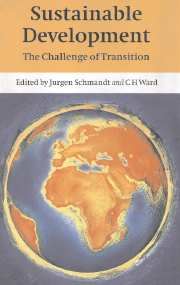Book contents
- Frontmatter
- Contents
- List of contributors
- Foreword
- Preface
- 1 Challenge and response
- 2 National self-interest in the pursuit of sustainable development
- 3 Uneconomic growth: Empty-world versus full-world economics
- 4 Population and consumption: From more to enough
- 5 Spirituality and sustainability
- 6 Leadership skills for sustainable development
- 7 The role of science: Guidance and service
- 8 Economic tools, international trade, and the role of business
- 9 Stakeholders and sustainable development
- 10 From idea to action: The role of policy
- Index
Preface
Published online by Cambridge University Press: 17 August 2009
- Frontmatter
- Contents
- List of contributors
- Foreword
- Preface
- 1 Challenge and response
- 2 National self-interest in the pursuit of sustainable development
- 3 Uneconomic growth: Empty-world versus full-world economics
- 4 Population and consumption: From more to enough
- 5 Spirituality and sustainability
- 6 Leadership skills for sustainable development
- 7 The role of science: Guidance and service
- 8 Economic tools, international trade, and the role of business
- 9 Stakeholders and sustainable development
- 10 From idea to action: The role of policy
- Index
Summary
One of the most important topics for the twenty-first Century is sustainable development – development that meets the needs of the present without foreclosing the needs and options of future generations. Sustainable development is a comprehensive concept involving many disciplines, giving it both a philosophical base and a pragmatic approach. It appeals to a wide range of interests from nations to corporations to stakeholders because it combines economic development and environmental protection into a single system.
As the global community enters into the next phase of the evolution of sustainable development, making the transition from theory to action will be the next great challenge. World population is expected to double within the next 50 years, placing enormous demands on resources for food, shelter, and energy. Innovative solutions, incorporating the concepts of sustainable development, must be developed and implemented to mitigate these impending economic and environmental uncertainties and to guide society through the resulting period of transition. Examining this shift from theory to action and developing a plan of action was the framework of the De Lange♦Woodlands Conference, which was held March 3–5, 1997 in the Alice Pratt Brown Hall at Rice University in Houston, Texas.
The conference was organized by the Energy and Environmental Systems Institute at Rice University and the Center for Global Studies at the Houston Advanced Research Center in The Woodlands, in partnership with the National Academy of Sciences and the James A. Baker III Institute for Public Policy at Rice University.
Information
- Type
- Chapter
- Information
- Sustainable DevelopmentThe Challenge of Transition, pp. xv - xviPublisher: Cambridge University PressPrint publication year: 2000
